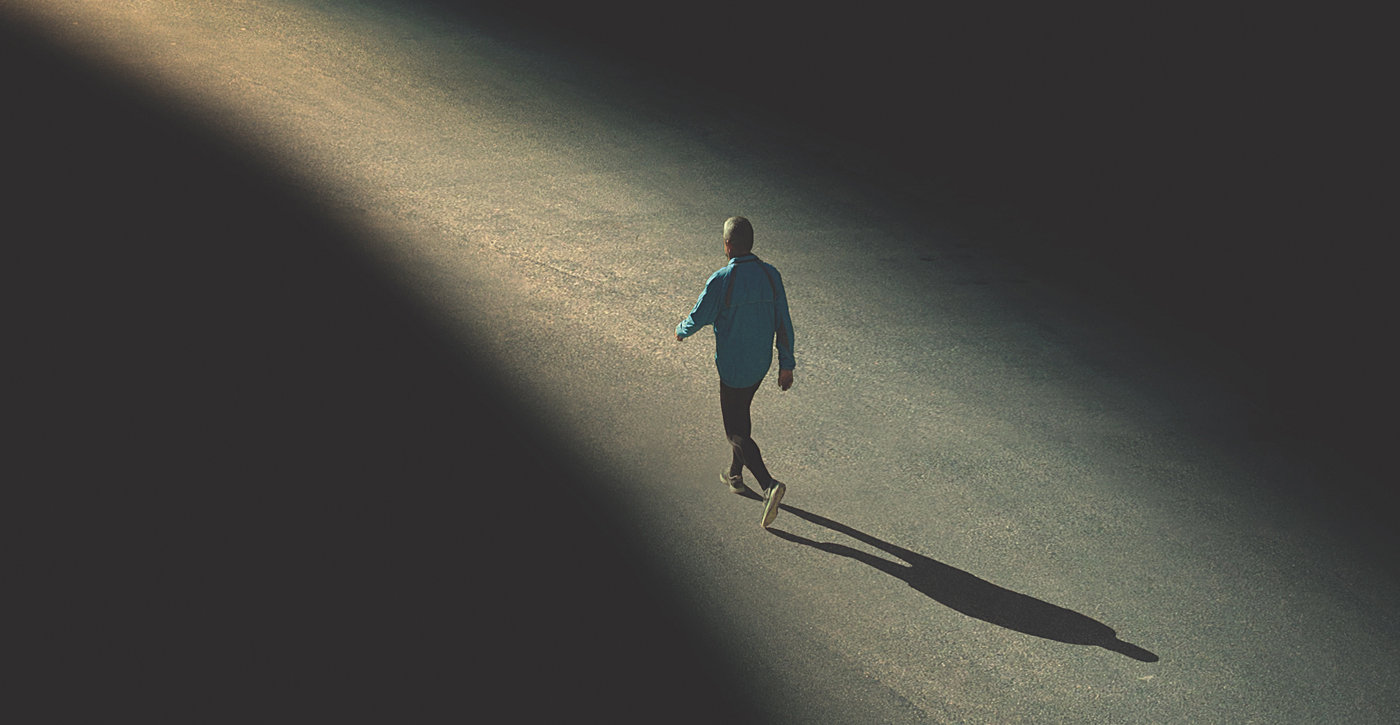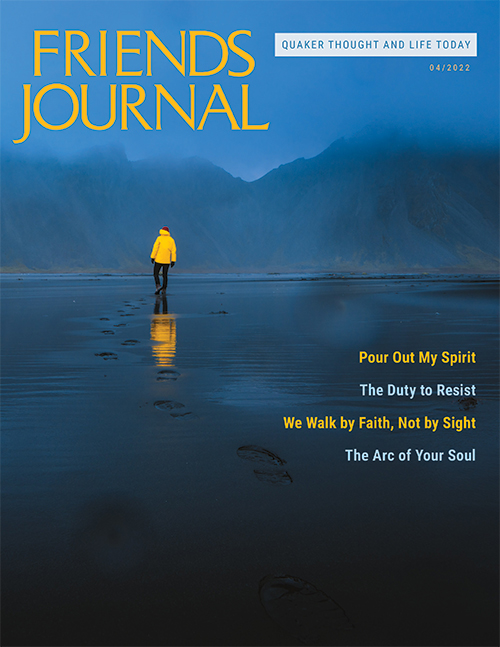As children, we learn about faith from our caregivers. They teach us to pray, sing, and light the Advent candles. Then, as adults, we learn about crises of faith from them: they teach us what happens when our prayers go unanswered, when the songs ring hollow, and when the candles are snuffed out. We realize that our caregivers are merely human. We bear witness to their fallibility, their fragility, and their doubts—and then we watch as they try to make sense of these things. We’re no longer children, but they are still our teachers.
For several years, I’ve been experiencing my own simmering crisis of faith, and my parents—my spiritual teachers—are part of the reason why. I struggle to reconcile their unwavering trust in God with the realities of my work in homeless services. I work specifically with chronically homeless men, a population that most people have little to no contact with. However, I have found that when I mention my work to Christians, they often have a particular image in mind: one that tends to come from Christian radio programming around the holidays. It usually involves toothless men praising God because they received five dollars on the street, or reciting Psalms for soup kitchen volunteers, or spontaneously singing hymns in thanks for a pair of socks. In these stories, they are jolly recipients of Christian charity whose lives serve as a reminder that God is a constant companion to the poor.
Let me offer you another perspective.
“Chronically homeless” means chronically homeless. It means a person has been homeless for decades, not just a few weeks on a friend’s couch. It means someone has a serious mental illness, a substance-use disorder, a chronic medical condition, a cognitive impairment, or all four at once. It means someone’s family supports are nonexistent or no longer viable, because the family members themselves are severely disabled, severely addicted, or living in poverty. It means low educational attainment, low levels of literacy, or a history of incarceration, though often all three. It means zero income, zero savings, zero investments, zero wealth, and zero assets. It means that even when someone does manage to exit homelessness, it’s not uncommon for him to end up back on the streets within a year.
This is the world I work in; it is also the world we live in. It may be more easily obscured for some than others, but it’s still there—and, believe me, it is not jolly. These are people who are suffering. These are people who crash and burn repeatedly, and who tend to die alone.
Yet if you ask my parents, they will tell you that after every crisis, God helps us land on our feet, every single time. This is their motto, and they’ve got the receipts to prove it. Over the course of their lifetimes and relationships, they have experienced it firsthand through mental illness, substance abuse, suicide, job loss, miscarriage, and divorce; take your pick. When I listen to them describe what it means to have faith, I can’t help but feel deeply comforted, because what is their well-being today if not proof that their faith was well-placed and rewarded? It’s hard to argue with them when they have, in fact, landed on their feet every single time. It’s comforting. It’s empowering. If faith permits you this kind of resilience and triumph, then yes, I want it.
I also work with people who can only be described as forsaken, whether by their God, their government, their family, or society. I’ve seen that with my own eyes, too. So I find myself in a position where I don’t know which sight to trust. I don’t know where to place my faith. In a God that helps some but not others? In a world that helps some but not others? Frankly, neither seems comforting, empowering, or uplifting.
But why is it that some people land on their feet every single time, while others experience life as a relentless and horrific descent? My work is a cherished source of meaning in my life, an opportunity to help alleviate the suffering of others, yet it is also a painful reminder that some things can’t be fixed: that sometimes, or even most of the time, there is not a happy ending to the story. Richard died of an overdose in an alleyway strewn with feces, rats, and garbage. Connor died of heart failure in a doorway, and it took several days for anyone to even notice his body. Eugene was stabbed to death in the park. Theo was beaten up and set on fire while sleeping on a bench. Evan hanged himself. I could go on. These are people who did not land on their feet. They died, miserably. They were also people who prayed, who volunteered in soup kitchens, and who slept in church courtyards because they wanted to feel close to God.
So what about their faith? Do we say it was simply…overlooked? By whom? By God? No. The God that I know is not a celestial diva. He is not forgetful, spiteful, partial, or cruel. He doesn’t roll his eyes at a person’s prayer for basic dignity.
So what’s going on here? When I think about the particular situations my parents describe from their own lives, I can’t help but notice a certain detail. In each moment of crisis, it wasn’t God so much as access to resources that made the difference. I don’t deny the presence of God or Spirit in their lives, and I don’t deny the transformations that have occurred in them. But if God worked miracles, he just so happened to do it through stocks, bonds, home ownership, quality mental health counseling, and consistent access to effective medications.

My parents’ faith in God certainly provided a sense of comfort, resilience, and direction during moments of real and profound crisis. God also served as the language, imagery, and shared history of the social support networks they leaned on during those times. God provided inner peace and community, which should never be undervalued or underestimated. But in terms of the material realities and outcomes, God did not pay the bills, write the prescriptions, or process the paperwork. If you present the pharmacist with a check signed by “God,” you will be leaving that store with nothing. “Inner Peace” is not a billable health insurance company. “Spirit” is not a valid credit card. At a certain point, material reality must be dealt with on its own terms, and those terms can be bureaucratic, racist, inflexible, and unforgiving.
My spiritual teachers inhabit a world where Jeremiah 29:11 (ESV) is true: “For I know the plans I have for you, declares the Lord, plans for welfare and not for evil, to give you a future and a hope.” They live in a world where God always provides, and I’ve seen it with my own eyes. But I also work with people who can only be described as forsaken, whether by their God, their government, their family, or society. I’ve seen that with my own eyes, too. So I find myself in a position where I don’t know which sight to trust. I don’t know where to place my faith. In a God that helps some but not others? In a world that helps some but not others? Frankly, neither seems comforting, empowering, or uplifting. Sometimes I wish that God really was a celestial diva, one who would look down at the state of the world and say, “Are you kidding me? Seriously, folks?” and clean it up.
But the more I think about it, the more I wonder if perhaps there is another way. In 2 Corinthians 5:7 (ESV), it says, “for we walk by faith, not by sight.” I understand this to mean that what we see when we look out upon the world is not necessarily the handwriting of God but what we ourselves have slapped together. If we’re going to use the sight of the world to judge anything, it should be to judge our own actions, not God’s. We live in a society that is structured unfairly; we live in a society that we have structured unfairly. We live in a society where there are sufficient resources, but they are not managed or distributed fairly, and so we see a world where some people are blessed while others are degraded. We see a world where those who have access to resources experience the possibilities of God’s will, while those who do not have access to resources experience the absence of God.
Yet I still have faith: faith that another kind of world is possible, one where living a dignified life does not depend on chance, money, race, or insurance status.
So where does that leave the question of faith? Speaking for myself, here’s what I think.
As a child, I learned about faith from my parents. They taught me to pray, sing, and light the Advent candles. They also taught me what happens when prayers go unanswered, when the songs ring hollow, and the candles are snuffed out. Through their own human struggle to make sense of life and themselves, they’ve taught me about how we respond to fear, doubt, and a crisis of faith. As an adult working in homeless services, I’ve learned that some things can’t be fixed, that sometimes faith is not enough. Yet I still have faith: faith that another kind of world is possible, one where living a dignified life does not depend on chance, money, race, or insurance status. I’m reminded that Advent itself means “coming,” and how in a crisis of any kind there is nothing more comforting than hearing the words “We’re on our way. Help is on the way.”
I think we have a long way to walk, but we walk by faith and not by sight.
I think we have a long way to walk, but we’re on our way.




This is why so many Quakers have worked tirelessly for social justice — a world where everyone is housed, everyone has medical care, everyone has a safe, clean neighborhood, an anti-racist education, and a comforting hand to hold. We don’t expect to simply walk forward in faith into a better world. We have to actively create it, regardless of how, or if, we think of God and God’s grace.
Thank you for this article. It speaks much to my own thoughts, doubts, my annoyance and people blaming God for what we have wrought. I’m not entirely clear about what “God” is, but I feel certain it is neither a beneficent Diva nor a heartless stone. More like a Wind, and we have a choice to be moving in the same direction — or to fight against it. Even knowing I have not ‘done enough’ in my life, I keep this concept close to my heart, and am grateful for the guidance and inspiration of people (and there are many) like Andrew Huff, who put their faith into action.
Etty Hillesum
(This material except for this poem is from the book,” A Liberation Theology for
Judaism” by Marc H. Ellis ‘ Etty Hillesum was born on January 15, 1914, in Middleburg, Holland. She was Jewish and from a very scholarly family. Etty had studied law, languages and psychology by the time the Second World War broke out. Holland became increasingly dominated by Nazi Germany and surrendered to Germany in the spring of 1940. By 1942 Jews were forced to wear the Star of David and wholesale deportations began. They were sent to Westerbork, a transit camp in the east of the Netherlands, which was the last stop before the extermination camp of Auschwitz where she died.
Witness
Etty Hillellesum Witness
Witness to life Witness to Joy Witness to God
Witness to the unspeakable Auschwitz
Your miracle too heavy your life too challenging
Your very life a song from the midst of death
Your life one continuing miracle
one continuous Dialogue with God
Where from your tears of gratitude how could you see past the abyss of ultimate evil and know the unknowable upholding you
Etty I know you live in us because you chose to be a witness
You lived God’s love God’s forgiveness
where from
your strength to love One
One who couldn’t save you
where from your strength to love
To defend protect
that fountain of love and goodness
to find in God Love Joy and Gratitude
I pray that we may carry
Your love onward
Marvin Hubbard 20/12 /1999
Or (condition #5): there is not housing available at whatever wages they’ve been able to earn.
As for the four conditions he listed: These are going to be more commonly claimed by applicants to any charitable program where the assumption is that only people suffering from one of them deserves help. Some homeless people I’ve known wouldn’t be caught dead in such places.
Some were clearly impaired; but others were not. The conditions of homeless life, especially the sleep deprivation and stress entailed, would ruin anyone’s health, physical or mental, given time.
Thanks for sharing this wonderful article!